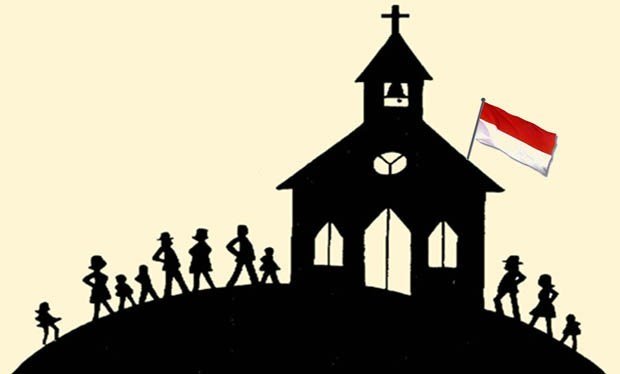
Civis 003/2016
I. Introduction
When we talk about Politics, it will be very similar with the talk about the State. So a talk about the relation of the Church and Politics will “drag” us to a discussion about the relation between the Church and the State. Politics, as I have discussed repeatedly in various writings, is the ability to live together in a polis. This is clear as disclosed in Jeremiah 29: 7 (NIV): “Also, seek the peace and prosperity of the city to which I have carried you into exile. Pray to the LORD for it, because if it prospers, you too will prosper.” From this, it is clear that Christians, including Christians in Indonesia, should not shy away from politics, let alone think of it as a taboo.
II. The Church and Politics In the Ecclesiastical Documents
The relation between the church and politics in Indonesia has been widely discussed. In various documents produced by the church, at least that is incorporated in the Communion of Churches in Indonesia (PGI), it is obvious about the church’s determination to be involved in politics. Since the PGI Assembly in Pematang Siantar (1971), churches have been seeing themselves as the one that is sent into the world, including in the political field. It has been understood as a call of the church.
In the Document of Church Union (DKG), both in PBIK (Understanding of Joint Christian Faith) and in PTPB (Principles of Joint Duty call), the calling of the church in politics was formulated. According to these documents, the church was placed by God to carry out its calling in the context of socio-political, socio-economical, and culture. The churches in Indonesia have been placed by God to carry out this task. The presence of churches in Indonesia should be seen as a sign of the mission of God to the churches to be actively involved in bringing peace, justice and integrity of creation in Indonesia.
In addition, they are called to be actively and creatively involved in the efforts to prevent anything that undermines and degrades Indonesia and all that damage the natural environment of Indonesia. This task was carried out through the prevention, defense, and law enforcement efforts for all Indonesian people.
III. How is the Church Recognition about the State?
The State has been recognized as a tool in the hands of God aimed for human welfare and preservation of God’s creation. Therefore, the Church and the State must work together in pursuing justice and promote the welfare of all people. But as an autonomous religious institutions, the Church carry out the functions and authority independently of the influence of the State, and vice versa, the Church is not entitled to regulate the life of the State because the State has its own function in running its task in the world (Roman 13: 6-7; I Peter 2: 13-14).
Thus the Church and the State must foster relationships that is coordinative and not a sub-ordinate relationship in which one master to another. The Church and the State have their own tasks that must be implemented with full responsibility for the good of all mankind and even the whole of creation. The Church has a duty to obey the State’s laws. In the PGI Assembly in Nias in 2014, these documents were not significantly changed.
If we look at these documents, it is clear that there are traces of Calvin. However we also sensed a new interpretation of Calvin’s view. It was necessarily so, because the circumstances experienced by Calvin in the 16th century with the people who have just escaped from the power of the Roman Catholic Church, is different from Indonesia’s Muslim majority, although Indonesia does not officially apply Islamic law. So indeed, Indonesia has always defined in a negative way as “neither a religious state, nor a secular state”.
But whatever the definition of the State is, the churches in Indonesia are determined not to be identical with the State. Critical attitude and solidarity have to be applied. Being critical does not equal to “a critic”. In “a critic” attitude, whatever the state does will be criticized without feeling as a part of the state and the nation, and without giving any solution. In a critical attitude, there should be an attitude of humility, such that the criticism applies also to the church that also offers the solutions. Solidarity is an attitude that sees itself as an integral part of this nation. The fate and hope of this nation is also fate and hope of the church. Therefore it will unlikely that the church will run away after delivering critics.
(This paper was presented by the writer in the Strategic Forum of Church and Politics, in Jakarta, April 7-9, 2016)

Rev. Dr. Andreas A. Yewangoe
Senior Fellow, the Leimena Institute
Rev. Dr. Andreas A. Yewangoe, born in Mamboru, Sumba, East Nusa Tenggara, 1945. Received his Bachelor’s degree in Theology (S.Th) of the STT Jakarta, 1969. Ordained as a pastor of the Christian Church of Sumba (GKS), which was assigned as a lecturer at the Kupang Academy of Theology (ATK), 1971. He led that academy from 1972 to 1976. He obtained the Doctorandus Theologiae degree from Vrije Universiteit in Amsterdam (1979). After a stint in his homeland, he returned again to the Vrije Universiteit for Doctor Theologiae promotion, 1987, with a dissertation entitled Theologia Crucis in Asia (1987). He once led the Christian University of Arta Wacana, which is an improvement and expansion of ATK, as rector in 1990-1998 (two periods). He served as one of the PGI chairman, from year 1994 to 2004 (two periods). Moreover, he was elected as the Chairman of PGI from the year 2004-2014 (two periods).
